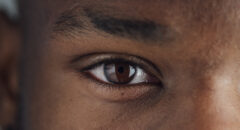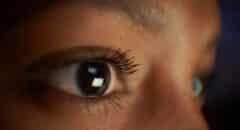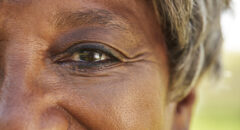
Your eyes are more than a window to your soul. They can also give you some insight into what’s going on with your health. While changes in your vision don’t have to be related to a chronic illness, certain conditions are known to affect your eye health. Sometimes, trouble with your vision is a sure sign that an illness is not managed well.
1. Blurry Vision In Both Eyes
Peple who have had diabetes for some time can experience a condition known as diabetic retinopathy. As your blood sugar levels rise, it can damage the blood vessels at the back of the retina. Since the retina is the light-sensitive part of the eye, you can have blurry vision. If the issue isn’t addressed, you run the risk of going blind. Other symptoms to look out for are increased thirst, constant fatigue, and unexplained weight loss.
RELATED: Diabetic Retinopathy: 1.2 Million African Americans To Be At Risk By 2030
2. Constant Pressure Behind The Eyes
If you always feel pressure behind the eyes, it usually means that your blood pressure is too high. This pressure can damage the blood vessels that lead to your eyes, which in turn can affect your vision. People with high blood pressure can also experience chest pains, severe headaches, and difficulty breathing.
3. Red Eyes
The medical term for red eyes is conjunctivitis and one condition that can cause this is measles. Adults don’t catch it often but it’s definitely a possibility. It’s worth checking out because a few of the complications from measles include corneal damage and infections. Other symptoms of the illness are a high fever, runny nose, and cough.
RELATED: The 10 Most Important Vitamins for Your Eyes
4. Inflamed, Infected Eyes
Lyme disease can affect the eyes in a similar way to measles. However, the disease can also cause inflammation in the middle part of the eye, optic nerve, and blood vessels in the retina. Signs of Lyme disease are fatigue, headache, and a rash.
5. Swollen Eyelids
With shingles, people develop painful rashes and blisters around the body. If they affect the face, you might have inflammation around the eyes, eye pain, and swollen eyelids. It’s best to get the condition treated by a doctor quickly. A few other symptoms of shingles are fever, headache, and itchy skin.
RELATED: Natural Ways To Take Care Of Dry Eyes
6. Frequent Dry Eyes
If your eyes are dry all the time, an autoimmune condition could be the cause. These conditions are known for influencing how the immune system attacks health issues so the eyes may be affected. Your eyes may also be red and itchy. Since the symptoms of autoimmune diseases can vary, pay attention to things like chronic fatigue and changes in your appetite.
7. Burning Sensation Around The Eyes
When people experience burning around the eyes combined with dry, itchy, or red eyes, they may have a skin condition known as rosacea. Occasionally, the condition also causes swollen eyelids and light sensitivity. With the right medication and skincare regimen, however, you can keep it under control.
8. Constant Itchy Eyes
Problems with the liver can cause irritation and the build-up of fat throughout the body. If your liver is damaged, you may get dry itchy eyes and fat collection on the eyelids. When left untreated, liver disease often leads to damaged corneas and lenses. Other symptoms to look out for are swollen ankles, yellowing in the skin, and constant nausea.
9. Worsening Vision
A proper diet is important to maintaining your eye health. People who aren’t getting the food they need can suffer from malnutrition, which damages the eyes over time. If not corrected, you can be at a higher risk of macular degeneration as you age. Other signs of malnutrition are chronic fatigue, poor concentration, and getting ill easily.
RELATED: Surprising Things That Can Cause Blindness eye health
10. Damaged Blood Vessels In The Eyes
The abnormal blood cells in sickle cell disease can damage the eyes’ blood vessels. If the condition isn’t managed well, you can eventually lose your vision. Other symptoms of sickle cell disease are swollen extremities, painful episodes, and chronic fatigue.
RELATED: 5 Signs You Need To See Your Eye Doctor eye health
When To See A Doctor
Ideally, you should have scheduled vision checks annually. During these visits, the doctor can pick up on any changes in your eyes. You don’t have to wait until these visits to say something. Let your primary care provider know if there have been any issues with your eyes so they can make recommendations. For those who have been diagnosed with a chronic illness already, poor vision might be a sign that your current medical regimen needs to be adjusted so make sure to talk to your doctor.
While it’s possible to experience certain issues like itchy or dry eyes temporarily, you should never ignore chronic symptoms. Sometimes, the damage done to your eyes can be permanent so it’s best to start treatment quickly.








